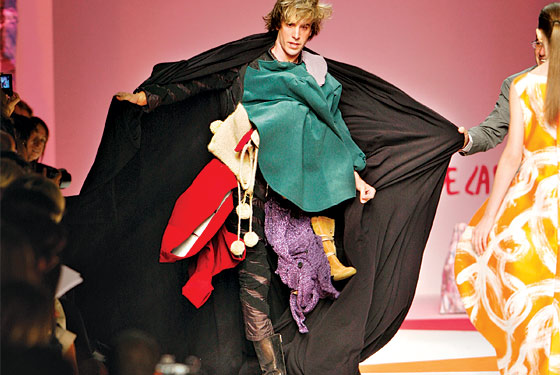
One of the most important rules of attending a fashion show is “Never be impressed by the front-row celebrities.” And it has been strictly obeyed up until this season, when one particular attendee had even the most blasé fashion editors gawping (in either delighted recognition or bafflement): a strangely coiffed, leather-clad man with a vaguely familiar nose. It turned out to be none other than Borat himself—well, almost. Instead, it was his near relation, Brüno.
Brüno is another alter ego of the British comic actor and provocateur Sacha Baron Cohen, who, post-Borat, is focusing on a target even more worthy of satire than a clueless tourist: the fashion guru. Brüno, a gay Austrian TV presenter, has been a recurrent character in Baron Cohen’s TV shows for ten years; notable YouTube clips show him persuading a bunch of drunken college wrestlers to flex their pecs for Austrian Gay TV, and auditioning as a dancer for a Missy Elliott video (“I mean, I know it’s gonna be great for Missy, but is it good for Brüno?”).
Brüno is now getting the cinematic treatment. Baron Cohen has begun a feature film about him (working title: Brüno), for which Brüno turned up in the audiences, and occasionally on the runways, of spring’s Milan and Paris shows. And where he went, confusion, fear, and anger followed. As usual.
In Milan, he crashed Agatha Ruiz de la Prada’s runway—literally, jumping on mid-show wearing a giant black cloak. He was taken away by Italian police. A spokeswoman for Ruiz de la Prada, who is said to be considering a lawsuit, said, “We have no idea how he got into the [building], but he entered our show from backstage with two other men. They carried [an industrial steamer] to make their way through the backstage area.” Brüno tried to get into Versace, but the PR people got wind of him and turned him away. A few editors who knew what was going on pleaded his case, but no go. Brüno used the opportunity to cause a scene for his crew, saying over and over again, “Don’t you know who I am?”
As the days went on and Brüno/Baron Cohen’s presence became more widely known, editors began to look for him with an almost gleeful excitement uncharacteristic of such a constitutionally jaded group. It seemed a little myopic; is the fashion industry’s self-obsession now so complete that it only enjoys a celebrity based on itself? But maybe Brüno provided a much needed (if silly) distraction from the increasingly apocalyptic headlines about the world economy, and the growing suspicion that this whole exercise was more irrelevant than ever.
Was this a rare display of a sense of humor on the industry’s part, as it was being mocked so openly to its face? Or was it, um, that they just didn’t really get it, that they were the clueless Americans to Brüno’s Borat, as it were?
Some of each. The British press cottoned on to the game first and, by the time Brüno got to Paris, were proudly showing off their insider knowledge to their colleagues; at that point, people were hoping for another Brüno outrage. I happened to be seated directly behind him at Stella McCartney (the designer, who’s a friend of the actor, invited him outright) and so got to observe the act, and the audience. Brüno, in the second row (much to his loudly huffing disgust), griped audibly about how fat the models were and how bored he was. He tried to alleviate at least the latter by puffing through a (clean, unused) tampon and occasionally standing up, bumping my nose with the elastic of the red lacy G-string hoicked worryingly high above his leather trousers. Some editors near him giggled into their notebooks, but many, still not in on the joke, looked at this gauche arriviste with disgusted impatience—until their colleagues whispered his real identity, and they hastily insisted they knew all along.
But if some of the audience members had to scramble to catch up with Brüno, he acclimatized to his environs much more quickly. When I asked him after the McCartney show for his thoughts on the clothes, he produced a bon mot worthy of Diana Vreeland or Suzy Menkes: “Meh.”
Additional reporting by Doria Santlofer